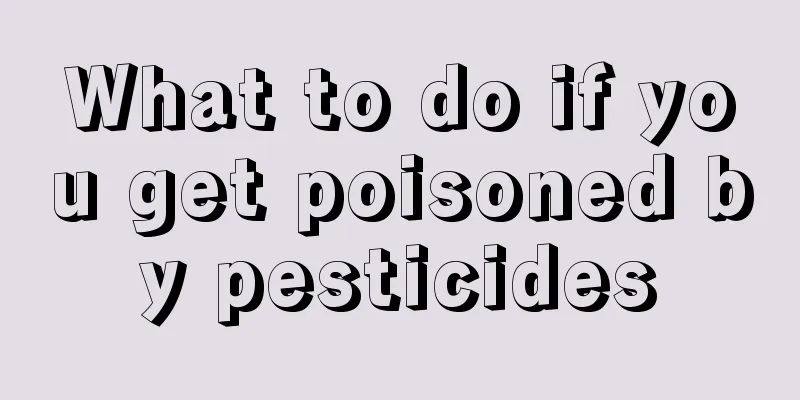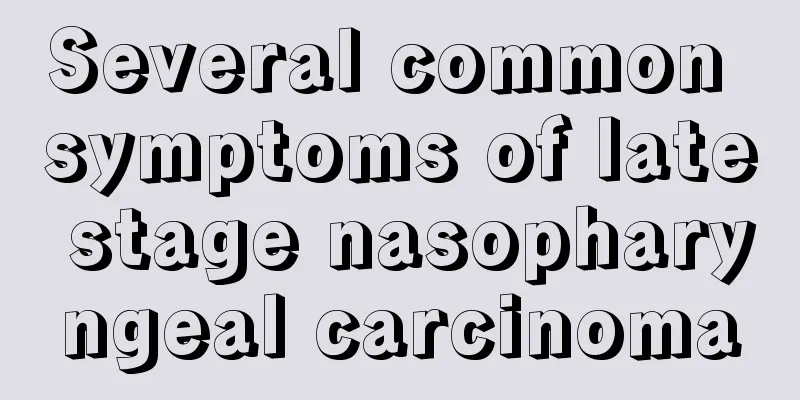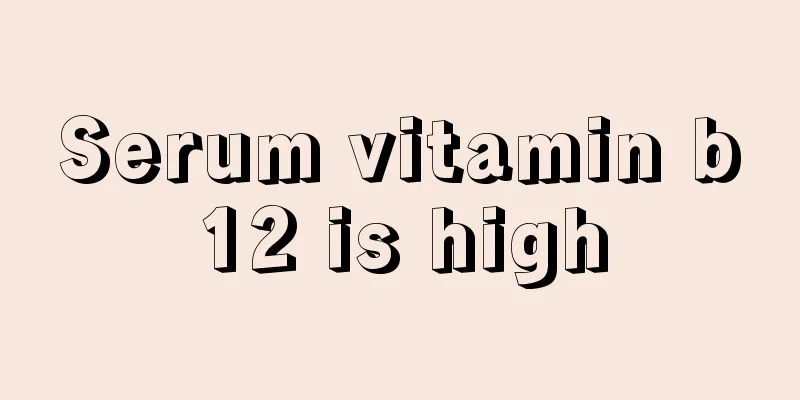What to do if you get poisoned by pesticides

|
When some farmers spray pesticides on the fields, they can easily cause pesticide poisoning due to improper operation. At this time, the poisoned person should be carried to a ventilated place in time, the patient's clothes should be taken off, and the poisoned part should be washed with soapy water. If the pesticide is taken orally, the patient should be sent to the hospital for enema treatment in time, and the patient should actively cooperate with the doctor for treatment during the period. What to do if you get poisoned by pesticides? 1. Once organophosphorus pesticide poisoning occurs, medical treatment should be sought immediately. 2. Move the patient to a well-ventilated place with fresh air quickly, take off contaminated clothing, and wash the skin that has come into contact with the pesticide repeatedly and thoroughly with soap and water. 3. For those who accidentally ingested the pesticide, immediately stimulate the tongue to induce vomiting, and wash the stomach with plenty of warm water or 2-5% sodium bicarbonate solution. However, in case of dichlorvos poisoning, alkaline solution gastric lavage is prohibited, and in case of poisoning with thiophosphate organic pesticides such as 1606, 1059, 3911, and dimethoate, potassium permanganate solution should not be used for gastric lavage. 4. Those with obvious poisoning symptoms should be sent to the hospital for treatment. 5. The use of special antidotes for atropine is very important. Depending on the severity of the disease, atropine 1 to 10 mg should be administered once every 10 minutes to 2 hours. The symptoms of atropineization include dilated pupils, dry mouth and skin, facial flushing, accelerated heart rate and disappearance of lung rales. 6. Apply pralidoxime or pralidoxime in a timely manner. 7. During the treatment process, oxygen can be given, respiratory secretions can be quickly cleared, respiratory center stimulants can be injected intramuscularly, and attention should be paid to maintaining water and electrolyte balance. Those with convulsions can receive chloral hydrate enema. 8. Finding out the type of poisoning pesticide is important for first aid. What are the symptoms of pesticide poisoning? 1. Symptoms of skin and mucous membrane irritation: After accidental oral ingestion, the oral mucosa and throat are irritated, causing pain, mild burning and ulceration, and oral ulcers; the eyes are contaminated with signs of conjunctivitis; undiluted preparations contaminate the skin, causing local irritation and itching, and erythema may appear. A small number of patients have skin allergies. 2. Gastrointestinal reactions are often the main symptoms of acute oral poisoning. In addition to redness and swelling of the oral mucosa, there are often nausea, vomiting, and upper abdominal pain. In severe cases, there are also gastrointestinal bleeding and diarrhea. 3. Damage to the respiratory system: Inhalation may cause coughing, wheezing, and rales in the lungs. In severe cases of oral poisoning, aspiration pneumonia and/or pulmonary edema may occur, with coughing, chest tightness, and dyspnea. In severe cases, respiratory failure may lead to death. 4. In addition to tachycardia or bradycardia, cardiovascular damage often causes low blood pressure. The initial drop in blood pressure may be due to the effect of reduced blood volume, but in the later stage it is the effect of the poison itself. Dogs were given intravenous injections of pure glyphosate and surfactants, and it was found that the blood pressure of dogs injected with surfactants was lower. Creatine kinase (CK) was elevated in some cases. 5. Neurological symptoms include dizziness, fatigue, and sweating, but generally no serious damage; however, in case of severe poisoning by large oral doses, abnormal consciousness, convulsions, and coma may also be seen. 6. Damage to the liver and kidneys is generally mild and can often recover on its own, but some patients may suffer from severe kidney damage or even acute renal failure due to hemolysis. How to use pesticides safely? 1. When purchasing pesticides, first pay attention to the packaging of the pesticides to prevent leakage. Pay attention to the name of the pesticide, the content of the active ingredient, the date of manufacture, instructions for use, etc. Pesticides that are unclear or expired are not allowed to be used. 2. When transporting pesticides, you should first check whether the packaging is intact. If leakage or rupture is found, repackage it with specified materials before transportation. 3. Pesticides must not be mixed with grains, vegetables, fruits, food, daily necessities, etc. and must be kept by a dedicated person. 4. Highly toxic pesticides such as methyl 1605, 1059, monocrotophos, methyl parathion, furadan, etc. are not allowed to be used on crops such as vegetables and fruits, and are not allowed to be used for spraying. Mixed preparations containing five highly toxic organophosphorus pesticides, including methyl parathion, parathion, methyl parathion, monocrotophos and phosphamidon, are not allowed to be sold or used. 5. When using pesticides, the personnel who prepare the pesticides must wear rubber gloves and are strictly prohibited from mixing the pesticides with their hands. When coated seeds are scattered or planted by hand, protective gloves must be worn to prevent poisoning from skin absorption. The remaining poisonous seeds should be destroyed and not used as food or feed. 6. Carefully check the switches, joints, and nozzles of the spraying machine before spraying. If blockage occurs during spraying, it is strictly forbidden to blow or suck the nozzle and filter with your mouth. 7. Packaged items that have contained pesticides are not allowed to be used to contain grain, oil, wine, water and other food and feed, and must be centrally disposed of. 8. The medicine shall not be used on the weak and sickly people, those who have skin diseases or other diseases and have not yet recovered, women who are breastfeeding, pregnant or menstruating, and those who have unhealed skin injuries. 9. Pesticide applicators are not allowed to drink alcohol during the application period. They must wear gas masks, long-sleeved tops, long pants, shoes and socks when applying pesticides. Smoking, drinking and eating are prohibited during the operation. Clothes contaminated by pesticides must be changed and washed in time. 10. The pesticide applicators shall not apply pesticides for more than six hours a day, and two persons shall take turns to operate backpack-type motorized pesticide equipment. After applying the pesticide continuously for 3 to 5 days, you should take a day off. 11. If the operator has symptoms such as headache, dizziness, nausea, vomiting, etc., he should leave the application site immediately, change contaminated clothes, rinse his mouth, hands, face and other exposed parts, and go to the hospital for treatment in time. |
<<: What should I drink if I develop colitis early
>>: What medicine should I take for diarrheal colitis
Recommend
Early symptoms and signs of laryngeal cancer
Laryngeal cancer refers to a malignant tumor that...
If ulcers recur, just press one spot
(Chen Miao, Run Run Shaw Hospital, Zhejiang Unive...
What to do if spinal compression of nerves causes insufficient blood supply to the brain
There are many reasons for insufficient blood sup...
Why do I always cough and have phlegm?
When it comes to coughing, the first thing people...
Will eating hen during confinement reduce milk production?
After giving birth, every woman has different phy...
What is the reason for sore feet and lack of strength
The symptom of sore feet and weak feet mainly occ...
How to solve dull and yellow skin?
Skin is the most important tissue for people. Alt...
How long does it take for primary liver cancer to form
The time it takes for primary liver cancer to dev...
How effective is biological immunotherapy in treating colorectal cancer
Colorectal cancer is a disease that endangers peo...
What is the reason why ovarian tumors are prone to recurrence
The arrival of diseases such as ovarian tumors is...
What are the types of bone cancer
What are the types of bone cancer? In recent year...
Symptoms of infants inhaling formaldehyde
After a house has just been renovated, there will...
Ways to prevent bladder cancer
Bladder tumors are common tumors with a higher in...
What causes itching around the nose
Many people experience itching around the nose, w...
Toenails have uneven horizontal lines, so this is what's going on
The health of the human body can be judged by cha...









